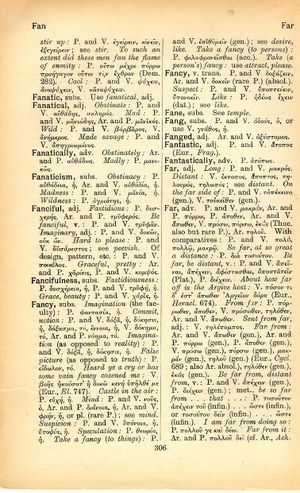fancy: Difference between revisions
Τὸ γὰρ θανεῖν οὐκ αἰσχρόν, ἀλλ' αἰσχρῶς θανεῖν → Mors ipsa non est foeda, sed foede mori → Das Sterben bringt nicht Schmach, doch sterben in der Schmach
(CSV4) |
m (Woodhouse1 replacement) |
||
| Line 1: | Line 1: | ||
{{Woodhouse1 | {{Woodhouse1 | ||
|Text=[[File:woodhouse_306.jpg|thumb|link={{filepath:woodhouse_306.jpg}}]] | |Text=[[File:woodhouse_306.jpg|thumb|link={{filepath:woodhouse_306.jpg}}]] | ||
===substantive=== | |||
[[imagination]] (the [[faculty]]): [[prose|P.]] [[φαντασία]], ἡ. | |||
[[conceit]], [[notion]]: [[prose|P.]] and [[verse|V.]] [[δόξα]], ἡ, [[δόκησις]], ἡ, [[δόξασμα]], τό, [[ἔννοια]], ἡ, [[verse|V.]] [[δόκημα]], τό, [[Aristophanes|Ar.]] and [[prose|P.]] [[νόημα]], τό. | |||
[[imagination]] ([[as opposed to reality]]): [[prose|P.]] and [[verse|V.]] [[δόξα]], ἡ, [[δόκησις]], ἡ. | |||
[[false picture]] ([[as opposed to truth]]): [[prose|P.]] [[εἴδωλον]], τό. | |||
[[heard ye a cry or has some vain fancy cozened me]]: [[verse|V.]] [[βοῆς ἠκούσατ' ἢ δοκὼ κενὴ ὑπῆλθέ]] με ([[Euripides|Eur.]], ''[[Electra]]'' 747). | |||
[[castle in the air]]: [[prose|P.]] [[εὐχή]], ἡ. | |||
P. | |||
[[mind]]: [[prose|P.]] and [[verse|V.]] [[νοῦς]], ὁ, [[Aristophanes|Ar.]] and [[prose|P.]] [[διάνοια]], ἡ, [[Aristophanes|Ar.]] and [[verse|V.]] [[φρήν]], ἡ, or pl. (rare [[prose|P.]]); see [[mind]]. | |||
[[suspicion]]: [[prose|P.]] and [[verse|V.]] [[ὑπόνοια]], ἡ, [[ὑποψία]], ἡ. | |||
[[speculation]]: [[prose|P.]] [[θεωρία]], ἡ. | |||
[[take a fancy]] ([[to things]]): [[prose|P.]] and [[verse|V.]] [[ἐπιθυμεῖν]] (gen.); see [[desire]], [[like]]. | |||
[[take a fancy]] ([[to persons]]): [[prose|P.]] [[φιλοφρονεῖσθαι]] (acc.). | |||
[[take]] (a [[person]]'s) [[fancy]]: use [[attract]], [[please]]. | |||
===verb transitive=== | |||
[[prose|P.]] [[and V δοξάζειν]], [[Aristophanes|Ar.]] and [[verse|V.]] [[δοκεῖν]] (rare [[prose|P.]]) (absol.). | |||
[[suspect]]: [[prose|P.]] and [[verse|V.]] [[ὑποπτεύειν]], [[ὑπονοεῖν]]. | |||
[[like]]: [[prose|P.]] [[ἡδέως ἔχειν]] (dat.); see [[like]]. | |||
}} | }} | ||
Revision as of 08:50, 20 May 2020
English > Greek (Woodhouse)
substantive
imagination (the faculty): P. φαντασία, ἡ.
conceit, notion: P. and V. δόξα, ἡ, δόκησις, ἡ, δόξασμα, τό, ἔννοια, ἡ, V. δόκημα, τό, Ar. and P. νόημα, τό.
imagination (as opposed to reality): P. and V. δόξα, ἡ, δόκησις, ἡ.
false picture (as opposed to truth): P. εἴδωλον, τό.
heard ye a cry or has some vain fancy cozened me: V. βοῆς ἠκούσατ' ἢ δοκὼ κενὴ ὑπῆλθέ με (Eur., Electra 747).
castle in the air: P. εὐχή, ἡ.
mind: P. and V. νοῦς, ὁ, Ar. and P. διάνοια, ἡ, Ar. and V. φρήν, ἡ, or pl. (rare P.); see mind.
suspicion: P. and V. ὑπόνοια, ἡ, ὑποψία, ἡ.
speculation: P. θεωρία, ἡ.
take a fancy (to things): P. and V. ἐπιθυμεῖν (gen.); see desire, like.
take a fancy (to persons): P. φιλοφρονεῖσθαι (acc.).
take (a person's) fancy: use attract, please.
verb transitive
P. and V δοξάζειν, Ar. and V. δοκεῖν (rare P.) (absol.).
suspect: P. and V. ὑποπτεύειν, ὑπονοεῖν.
like: P. ἡδέως ἔχειν (dat.); see like.

